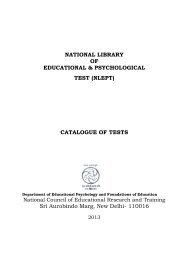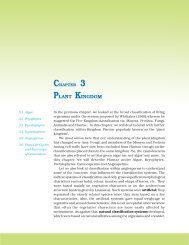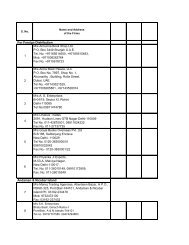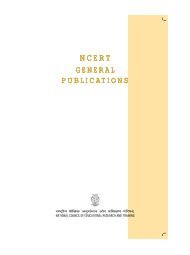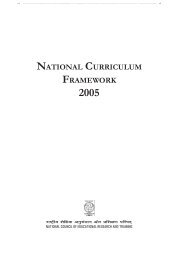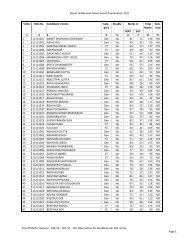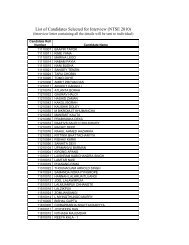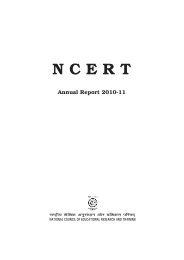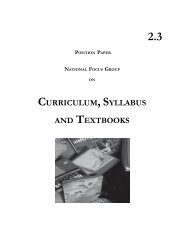indian education - National Council Of Educational Research And ...
indian education - National Council Of Educational Research And ...
indian education - National Council Of Educational Research And ...
Create successful ePaper yourself
Turn your PDF publications into a flip-book with our unique Google optimized e-Paper software.
36 Journal of Indian Education August 2007<br />
additional employment. In a joint paper<br />
with Anupam Bhatia, the authors mourn<br />
the systematic depletion of the commons<br />
‘closely associated with the depletion of<br />
social capital, i.e. the community spirit<br />
and actions reflecting reciprocity, trust,<br />
shared values, net working and group<br />
action’ (Jodha and Bhatia, 1998).<br />
The above writers place our location<br />
a certain perspective that we had to<br />
address if <strong>education</strong> is to stand for the<br />
values of peace with justice.<br />
Krishnamurti, who did not by principle<br />
create a blueprint for any of his schools,<br />
leaving the implementation of his visions<br />
to the school’s location and to the talents<br />
of the people running it, concentrated his<br />
thought on the moral dimensions related<br />
to schooling. In typically metaphorical<br />
fashion he warned those in charge of the<br />
school against the tendency of an<br />
isolated <strong>education</strong>al institution<br />
becoming self-enclosed. ‘Don’t be a<br />
community,’ he admonished, ‘There is<br />
something aggressive and self-centred<br />
about them. Instead keep your doors<br />
open.’ A community has to define itself;<br />
self-definitions set up boundaries<br />
excluding those who fall outside the<br />
defined essence. Krishnamurti wanted<br />
his school to keep its `doors open’. Closed<br />
doors and impenetrable walls are made<br />
up of exclusive ideals, class and caste<br />
prejudice. Its structures are held<br />
together by comparison, and the desire<br />
to dominate others; greed, envy and a<br />
lust to dominate support group<br />
consciousness. He made the question,<br />
‘how should we live?’ central to his<br />
<strong>education</strong>al enterprise. How should we<br />
as individuals live and what should be<br />
the school’s relations with its<br />
neighbours? – these questions moulded<br />
the school for the past several decades.<br />
The realisation that the direction<br />
Krishnamurti was setting for his school<br />
went against the spirit of the present age,<br />
against parents’ urge to get the best for<br />
their children, against India’s aspirations<br />
to become a global player was all<br />
pervasive. The following quotation from<br />
a very recent articulation of this trend,<br />
by a blue ribbon <strong>education</strong> commission<br />
set up to re-think American <strong>education</strong><br />
reflects the <strong>education</strong>al policies in<br />
several countries, including our own.<br />
‘There is this growing mismatch,’ the<br />
report says ‘between the demands of the<br />
economy and what our schools are<br />
supplying.’<br />
If we continue on our current course,<br />
the number of nations outpacing us in the<br />
<strong>education</strong> race continues to grow at its and<br />
current rate, the American standard of<br />
living will steadily fall relative to those<br />
nations, rich and poor, that are doing a<br />
better job (The New York Times, December<br />
15, 2006).<br />
The pervasive anxiety driving reform<br />
was described earlier this year by the<br />
columnist Thomas Friedman:<br />
Computers, fibber-optic cable and the<br />
Internet have levelled the economic playing<br />
field, creating a global platform that more<br />
workers anywhere can now plug into and<br />
play on. Capital will now flow faster than<br />
ever to tap the most productive talent<br />
wherever it is located, so every country is<br />
scrambling to upgrade its human talent<br />
base (New York Times, March 24, 2006).<br />
In such a climate of international<br />
competition, governments see investment<br />
in <strong>education</strong> largely as a way of<br />
enhancing the country’s GDP and by<br />
individuals as commanding the best<br />
international jobs. Earlier ideals of<br />
liberty, equality and fraternity take a<br />
back seat in the nation’s priorities. The



